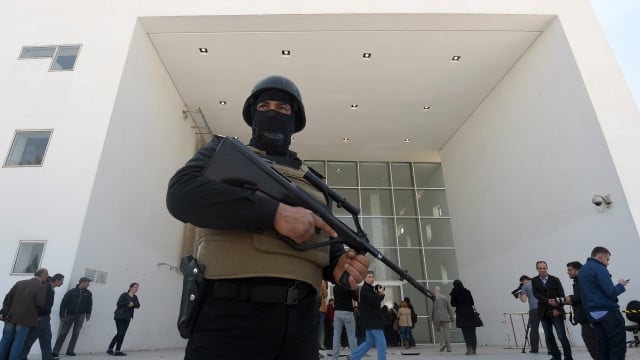
Tunisian authorities have made nine arrests in the wake of yesterday’s attack on the National Bardo Museum in Tunis, which took the lives of 20 foreign tourists and three Tunisians, reports the New York Times (see Gunmen Kill 21 Including Tourists in Attack at Tunisia’s National Bardo Museum).
Four of the current suspects in custody are believed to have been directly involved in the attack, with five additional accomplices. Tunisian authorities have named Yassine Laabidi and Saber Khachnaouia (not known terrorists) as the two gunmen, who were also killed during the three-hour standoff and hostage situation.
In response to the violence, the government will dispatch military troops to its major cities, a major blow to stability in what was considered the sole success story of 2011’s Arab Spring. Tourism will also likely take a major hit, as Costa Cruises, which had over 3,000 passengers in port in Tunis yesterday, has already announced plans to indefinitely cancel all future stops in the country.
Though authorities have yet to establish any definitive links between the suspects and known terrorist organizations, ISIS has taken responsibility for the incident. In an audio recording shared via several ISIS Twitter accounts, the militant group claimed that two of its Tunisian militants, Abu Zakaria al-Tunisi and Abu Anas al-Tunisi, had attacked a “malicious group from the citizens of the Crusader countries.” The message also warned “apostates in Muslim Tunisia” that “you will not enjoy security nor be pleased with peace while the Islamic State has men like these.”
Despite recent peaceful elections in Tunisia, ISIS has been actively recruiting there, reportedly attracting some 3,000–5,000 recruits from the country. It seems likely that neighboring Libya has served as a convenient stronghold in which to plan terrorist attacks on Tunisia.
Uqba ibn Nafi Battalion, a Tunisian militant group allied with Al Qaeda, also has released messages praising the attack that seemed to indicate its involvement.
According to the Washington Post, young people demonstrated outside the museum today, holding up signs that read, in French, “I am Tunisian. I am Bardo. I am Charlie,” comparing yesterday’s attack to the recent massacre at the offices of French satirical magazine Charlie Hebdo (see #JeSuisCharlie: A Digest of Responses to the Killings at Charlie Hebdo).
Tunisian President Beji Caid Essebsi has also been outspoken in his condemnation of the attack. “I want the Tunisian people to understand that we are in a merciless war against terrorism and that these savage minorities do not frighten us. . . . We will fight them without mercy to our last breath.”